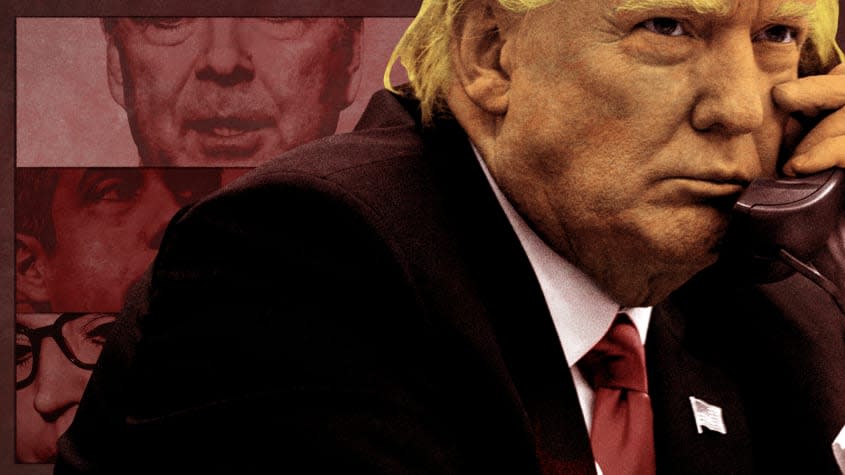A history of Trump's alleged witness tampering

- Oops!Something went wrong.Please try again later.
- Oops!Something went wrong.Please try again later.
- Oops!Something went wrong.Please try again later.
- Oops!Something went wrong.Please try again later.
- Oops!Something went wrong.Please try again later.
Is Donald Trump trying to undermine the work of the Jan. 6 committee? Rep. Liz Cheney (R-Wyo.) has certainly been hinting at that possibility. "After our last hearing, President Trump tried to call a witness in our investigation — a witness you have not yet seen in these hearings," Cheney revealed this week. "That person declined to answer or respond to President Trump's call, and instead alerted their lawyer to the call. Their lawyer alerted us."
That person was a member of the White House support staff during Trump's presidency, CNN later revealed. And that has raised concerns among investigators trying to get to the bottom of the insurrection. "This has been an ongoing pattern and we're trying to send the message that witness tampering is a crime in the United States of America," said Rep. Jamie Raskin (D-Md.).
This isn't the first time Trump has faced questions about interfering with the various investigations into his activities. Here's everything you need to know:
Firing James Comey
Early in his presidential term, Trump fired FBI Director James Comey. Why? "Because he wasn't doing a good job, simply," he told reporters. "He was not doing a good job." But in an interview with NBC's Lester Holt, Trump seemed to hint that the firing stemmed from anger over ongoing investigations into his campaign's possible involvement with Russia in the 2016 election. "And in fact when I decided to just do it, I said to myself, I said you know, this Russia thing with Trump and Russia is a made up story, it's an excuse by the Democrats for having lost an election that they should have won," Trump told Holt.
Comey reported that Trump had leaned on him — during a dinner on Valentine's Day in 2017 — to go easy in the bureau's investigation of Mike Flynn, the former national security advisor who eventually pleaded guilty to lying to the FBI about his contacts with the Russian ambassador. Comey testified that Trump said: "I hope you can see your way clear to letting this go, to letting Flynn go. He is a good guy. I hope you can let this go." The request made Comey nervous. "I had understood the president to be requesting that we drop any investigation of Flynn in connection with false statements about his conversations with the Russian ambassador in December," he told the Senate Intelligence Committee in June 2017.
Flynn was convicted — but was pardoned by Trump after the 2020 election. He was most recently in the news due to a video appearance before the Jan. 6 committee, taking the Fifth in response to questions about whether he believes in the peaceful transfer of power.
Pressuring Michael Cohen
Cohen was Trump's longtime lawyer and fixer, which put him in a critical position regarding Trump's activities — including payments to Stormy Daniels, the adult film star with whom Trump had had a brief sexual relationship. Cohen's role in those payments came under scrutiny, according to CNN's Marshall Cohen (no relation): "After the FBI raided Cohen's home and office, Trump publicly defended him and said he didn't think Cohen would 'flip.' A lawyer close to Trump attorney Rudy Giuliani emailed Cohen saying that he should 'sleep well' because 'you have friends in high places.' Cohen told investigators that another Trump lawyer had said he'd be fine, and maybe get a pardon, if he stayed on message."
But Cohen did flip, testifying to Congress in 2019 — and making a stark prediction about his former boss: "I fear that if he loses the election in 2020 that there will never be a peaceful transition of power." That testimony happened only after Trump and Rudy Giuliani went public with comments suggesting that Cohen's father-in-law might be targeted for a federal investigation, raising questions about whether their activities constituted obstruction of justice. "We understand that Mr. Cohen's wife and other family members fear for their safety after these attacks," Reps. Elijah Cummings (D-Md.) and Adam Schiff (D-Calif.) said in a joint statement. Cohen later served a prison sentence on convictions for violating campaign finance laws and lying to Congress during an earlier hearing.
The Mueller report
No charges ever came from Robert Mueller's investigation of Trump's Russia contacts. But Mueller, the former FBI director, strongly suggested that Trump might have faced obstruction charges if he had not been president. In fact, Mueller's final report cited 10 instances — including the firing of Comey, and the Michael Cohen incidents — that served as possible moments when Trump had tried to interfere with his inquiry. Other times included his efforts to get Mueller fired from the special counsel investigation.
From a layperson's standpoint, Mueller's conclusions about obstructions probably seemed like a haze of double negativity: The investigators weren't saying Trump had obstructed justice, but they weren't not saying it either. "If we had confidence after a thorough investigation of the facts that the president clearly did not commit obstruction of justice, we would so state," Mueller's final report said. "Based on the facts and the applicable legal standards, however, we are unable to reach that judgment." The legal standard, though, is that the Department of Justice has a policy against prosecuting the sitting president. Mueller, however, didn't want to make it seem like Trump had been found innocent of the accusations. "While this report does not conclude that the president committed a crime, it also does not exonerate him."
You may also like
Twitter: Musk tries to cancel the wedding

